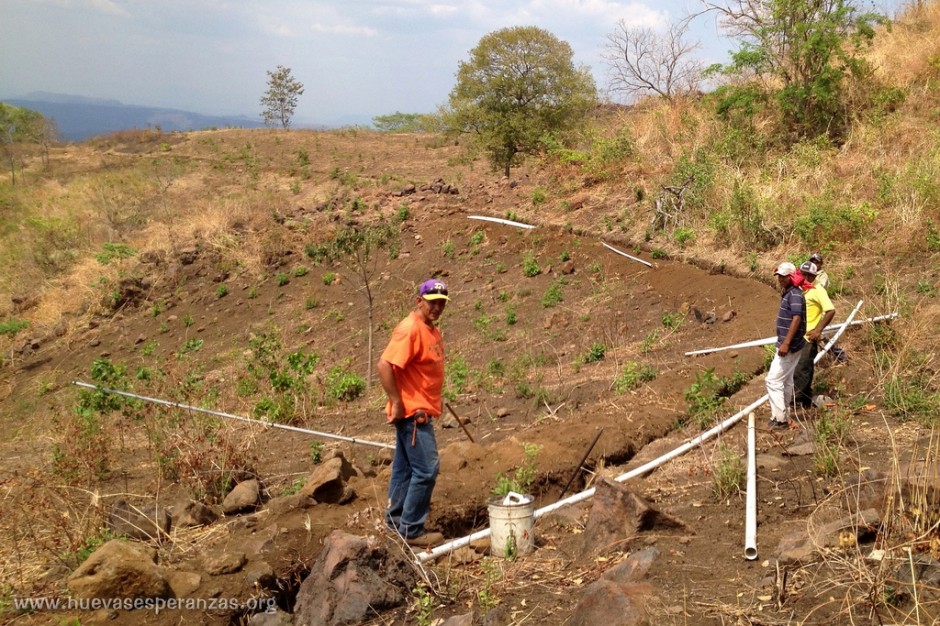 Tim Middleton, GfGD Advocacy Officer, interviews Dr. Andrew Longley, Director of the Nicaragua-based NGO Nuevas Esperanzas.
Tim Middleton, GfGD Advocacy Officer, interviews Dr. Andrew Longley, Director of the Nicaragua-based NGO Nuevas Esperanzas.
It’s a warm June day, so I suggest that we sit outside. We take our coffees onto the rooftop terrace and admire the view across Oxford. Before long, however, Andrew is zipping up his fleece and starting to shiver; he’s used to the rather warmer climate in Nicaragua. In fact, his home city of León is twinned with Oxford—a partnership which has given rise to the Oxford León Association—so our meeting place feels particularly apt. Andrew spends most of the year in Nicaragua running the NGO Nuevas Esperanzas, and only comes back to the UK for a month or two each summer.
So how did you end up running an NGO, I ask—was this always the plan? “The obvious seed was planted when I was an undergraduate here in Oxford,” he recalls, “I volunteered with Tearfund, in what was then Zaire, between my first and second years.” After his undergraduate degree, Andrew moved to the University of East Anglia to complete a PhD on carbonate sedimentology. “It was really a bit of a distraction,” he muses. He then proceeded to a Masters degree in hydrogeology at Newcastle, a position at the Environment Agency working on water resources for London, and finally a job with Atkins consulting on groundwater modelling. “Throughout this time,” says Andrew, “I knew this wasn’t fundamentally what I wanted to do with my life. I wanted to ‘dig holes in Africa’, but I just needed the money.” In total, it took Andrew more than a decade to find his way back to the development work that he really wanted to do; patience is definitely a necessary virtue for this kind of work.
How did you finally make the jump? “At first, I took unpaid leave in order to spend two months in Nicaragua,” says Andrew. Before long, two months turned into two years spent volunteering with a large NGO; two years then turned into a permanent move. “I didn’t go there with the intention of starting an NGO,” he remembers, “but when the one I was working for pulled out of the country I became disillusioned with the whole thing.” Andrew’s past experiences prompt him to talk candidly about the development sector as a whole: “Ninety percent of what I see done in the name of charity is probably unhelpful—yet so many of the mistakes are avoidable. Finding an academic who speaks highly of NGOs can often be hard.” He continues: “I never lost faith in what we were trying to do, just in how it was being done—I felt I had a lot of unfinished business.” So it was, in 2005, that Nuevas Esperanzas—which translates as ‘New Hope’—was born.
The organisation works primarily in a group of fifteen rural communities in the western half of the country. With his background in hydrogeology Andrew has been able to provide considerable assistance with water projects, especially when arsenic was discovered in the local groundwater. However, Andrew is very keen that Nuevas Esperanzas should work not just on water, but on “integrated rural development”, a maxim that has lead him to embrace everything from road-building to exporting honey. He also employs primarily Nicaraguan staff. Furthermore, as a resident of the city of León, a Spanish speaker, and a geologist, Andrew’s expertise has been much sought after during recent disasters, providing advice during both the 2011 eruption of the nearby Telica volcano and Hurricane Felix in 2007. “Next year,” Andrew tells me, “I’m planning to take a sabbatical. I want to take time to reflect on my experience and, hopefully, write a book.”
In the mean time, though, Nuevas Esperanzas is able to offer the opportunity to gain experience working in Nicaragua. “We’re not a volunteer-driven organisation,” warns Andrew, “and we’re not trying to create a volunteer organisation.” That said, Andrew is keen for people to learn alongside his Nicaraguan staff. More information is available here: http://www.nuevasesperanzas.org/index.php/en/get-involved/volunteer.


